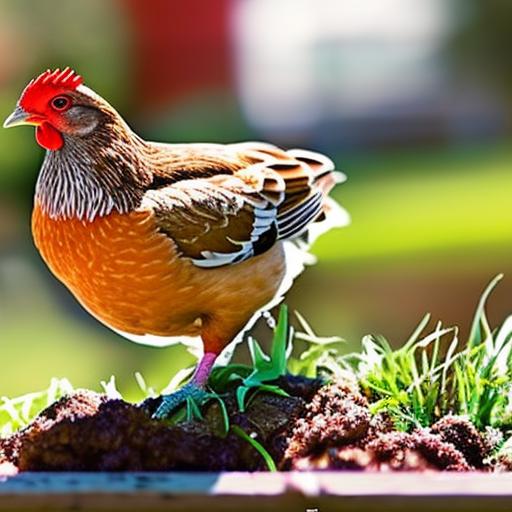In recent years, there has been a growing trend of urban chicken keeping in Indianapolis. More and more residents are choosing to raise chickens in their backyard, reaping the benefits of fresh eggs and a closer connection to their food source. This article will provide an overview of the popularity of urban chicken keeping in Indianapolis and explore the benefits of keeping chickens in the city.
Urban chicken keeping has become increasingly popular in Indianapolis as people seek to live a more sustainable and self-sufficient lifestyle. Raising chickens in the city allows residents to have a direct source of fresh eggs, which are often considered to be healthier and more flavorful than store-bought eggs. In addition, chickens can help reduce food waste by consuming kitchen scraps and turning them into nutrient-rich compost.
Key Takeaways
- Urban chicken keeping is a growing trend in Indianapolis.
- It is important to understand the rules and regulations for keeping chickens in the city.
- Adequate shelter and space are necessary for urban chickens.
- Meeting the nutritional needs of chickens is crucial for their health.
- Preventing disease and keeping chickens healthy is essential in the city.
Local Regulations: Understanding the Rules and Regulations for Keeping Chickens in Indianapolis
Before embarking on your urban chicken keeping journey, it is important to familiarize yourself with the rules and regulations set by the city of Indianapolis. The city has specific guidelines in place to ensure that chickens are kept in a safe and responsible manner.
In Indianapolis, residents are allowed to keep up to 12 chickens on their property, as long as they obtain a permit from the city. The permit requires an annual fee and must be renewed each year. It is important to note that roosters are not allowed within city limits due to noise concerns.
Housing and Space Requirements: Providing Adequate Shelter for Your Chickens in the City
When it comes to housing your chickens in an urban setting, there are a few key considerations to keep in mind. First, you will need to provide a suitable coop for your chickens to live in. There are various types of coops available, ranging from small portable coops to larger stationary structures.
In terms of space requirements, each chicken should have at least 4 square feet of coop space and 10 square feet of outdoor space. It is important to provide enough space for your chickens to move around comfortably and engage in natural behaviors such as scratching and dust bathing.
To keep your chickens safe from predators, it is essential to secure the coop with sturdy fencing and lockable doors. Additionally, consider installing motion-activated lights or a security camera to deter potential predators.
Feeding and Nutrition: Meeting the Nutritional Needs of Your Urban Chickens
Proper nutrition is crucial for the health and well-being of your urban chickens. There are various types of feed available for chickens, including commercial feeds, organic feeds, and homemade feeds. It is important to choose a feed that is appropriate for the age and breed of your chickens.
Chickens require a balanced diet that includes protein, carbohydrates, fats, vitamins, and minerals. Commercial feeds are formulated to meet these nutritional requirements, but it is also important to supplement their diet with fresh fruits and vegetables. Additionally, providing access to grit and oyster shell will help chickens with digestion and eggshell production.
Health and Disease Prevention: Tips for Keeping Your Chickens Healthy in the City
Just like any other animal, chickens are susceptible to various health issues. It is important to take preventative measures to keep your urban chickens healthy and minimize the risk of disease.
Common health issues for chickens include respiratory infections, parasites, and egg-laying problems. To prevent respiratory infections, ensure that your coop is well-ventilated and clean. Regularly inspect your chickens for signs of parasites such as mites or lice, and treat them accordingly. Egg-laying problems can be prevented by providing a balanced diet, ensuring access to clean water, and maintaining a stress-free environment.
Breeds Suitable for Urban Settings: Choosing the Right Chickens for Your Indianapolis Backyard

When choosing chickens for your urban backyard in Indianapolis, it is important to consider the breed that will best suit your needs and environment. Some breeds are better suited for urban settings due to their smaller size, quieter nature, and ability to adapt to confined spaces.
Bantam breeds, such as Silkies and Polish, are popular choices for urban chicken keeping due to their small size and friendly temperament. Other breeds that are well-suited for urban settings include Easter Eggers, Australorps, and Wyandottes. It is important to research the characteristics of different breeds and choose ones that align with your preferences and needs.
Egg Production: Maximizing Your Chickens’ Egg Laying Potential in the City
If one of your main motivations for keeping chickens in the city is to have a fresh supply of eggs, it is important to understand the factors that can affect egg production. Factors such as breed, age, diet, lighting, and stress levels can all impact a chicken’s ability to lay eggs.
To maximize egg production, ensure that your chickens have a balanced diet that meets their nutritional needs. Provide them with a consistent light source to simulate natural daylight hours, as chickens require around 14-16 hours of light per day to lay eggs consistently. Minimize stress in your chickens by providing a clean and comfortable environment.
Noise and Odor Concerns: Addressing Potential Issues with Neighbors and City Officials
One potential concern when keeping chickens in an urban setting is noise and odor. While chickens are generally not noisy animals, roosters can be quite vocal. However, since roosters are not allowed within city limits in Indianapolis, this should not be a major concern.
To minimize odor from your chickens, regularly clean their coop and provide proper ventilation. Composting chicken manure can also help reduce odor and provide nutrient-rich compost for your garden.
If you receive complaints from neighbors or city officials regarding your chickens, it is important to address their concerns in a respectful and responsible manner. Offer to show them your well-maintained coop and explain the steps you are taking to minimize noise and odor. Being a responsible chicken owner and good neighbor is essential in maintaining a positive relationship with those around you.
Benefits of Urban Chicken Keeping: Why More and More Indianapolis Residents are Keeping Chickens
There are numerous benefits to keeping chickens in an urban setting, which is why more and more Indianapolis residents are choosing to embark on this rewarding endeavor.
One of the main benefits of urban chicken keeping is the ability to have a direct source of fresh eggs. Fresh eggs are often considered to be healthier and more flavorful than store-bought eggs, as they are produced by chickens that have access to a varied diet and plenty of outdoor space.
In addition to the health benefits, urban chicken keeping also has environmental benefits. Chickens help reduce food waste by consuming kitchen scraps, which would otherwise end up in the landfill. They also produce nutrient-rich manure that can be used as fertilizer for gardens, reducing the need for chemical fertilizers.
Furthermore, keeping chickens in an urban setting provides educational benefits for children. Children can learn about where their food comes from, the importance of responsible animal care, and the cycle of life. It can also teach them valuable skills such as responsibility, empathy, and problem-solving.
Is Keeping Chickens in Indianapolis Right for You?
In conclusion, urban chicken keeping in Indianapolis has become increasingly popular due to its numerous benefits. From fresh eggs to environmental sustainability to educational opportunities, there are many reasons why more and more residents are choosing to raise chickens in their backyard.
However, it is important to do thorough research and consider if keeping chickens is right for you. It requires time, effort, and commitment to provide proper care for your chickens and ensure their well-being. Familiarize yourself with the local regulations, understand the housing and space requirements, and be prepared to address any potential concerns from neighbors or city officials.
If you are willing to put in the effort and have a genuine interest in raising chickens, urban chicken keeping can be a rewarding and fulfilling experience. It allows you to have a closer connection to your food source, reduce your environmental impact, and enjoy the many benefits that come with having chickens in your backyard.
If you’re wondering whether you can keep chickens in Indianapolis, you’ll be glad to know that it’s entirely possible! In fact, there are many resources available to help you get started. One such resource is an article on Poultry Wizard titled “Farmhouse Chicken Coop: A Perfect Home for Your Feathered Friends.” This informative piece provides valuable insights into building a chicken coop that suits the needs of your flock. Whether you’re a beginner or an experienced chicken keeper, this article offers practical tips and advice to ensure your chickens are happy and healthy. Check it out here!
FAQs
What are the rules and regulations for keeping chickens in Indianapolis?
According to the Indianapolis Municipal Code, residents are allowed to keep up to 12 chickens on their property as long as they meet certain requirements such as providing adequate shelter, fencing, and waste management.
Do I need a permit to keep chickens in Indianapolis?
Yes, residents are required to obtain a permit from the Department of Business and Neighborhood Services before keeping chickens on their property.
What kind of housing do I need for my chickens?
The housing for chickens must be secure, ventilated, and provide at least 2 square feet of space per chicken. It should also be predator-proof and have a roosting area, nesting boxes, and a place for food and water.
What kind of fencing do I need for my chicken coop?
The fencing for the chicken coop must be at least 6 feet high and made of sturdy material such as welded wire or chain link. It should also be buried at least 6 inches into the ground to prevent predators from digging underneath.
What kind of food and water do chickens need?
Chickens need a balanced diet of grains, protein, and calcium. They also need access to clean water at all times.
What are the benefits of keeping chickens in Indianapolis?
Keeping chickens can provide a source of fresh eggs, natural pest control, and fertilizer for gardens. It can also be a fun and educational hobby for families.
Meet Walter, the feathered-friend fanatic of Florida! Nestled in the sunshine state, Walter struts through life with his feathered companions, clucking his way to happiness. With a coop that’s fancier than a five-star hotel, he’s the Don Juan of the chicken world. When he’s not teaching his hens to do the cha-cha, you’ll find him in a heated debate with his prized rooster, Sir Clucks-a-Lot. Walter’s poultry passion is no yolk; he’s the sunny-side-up guy you never knew you needed in your flock of friends!







